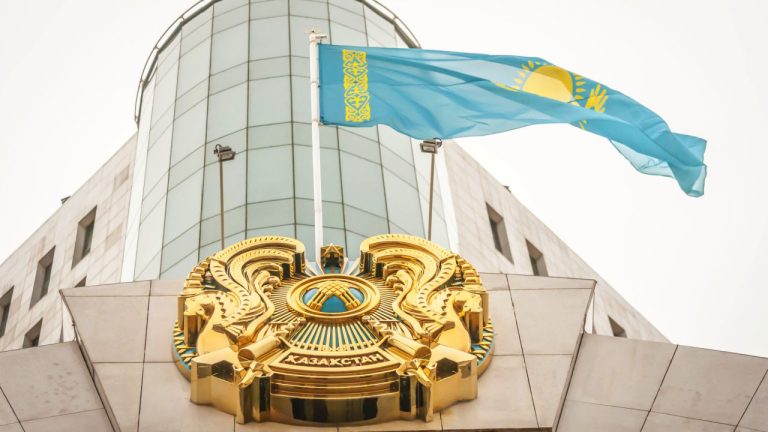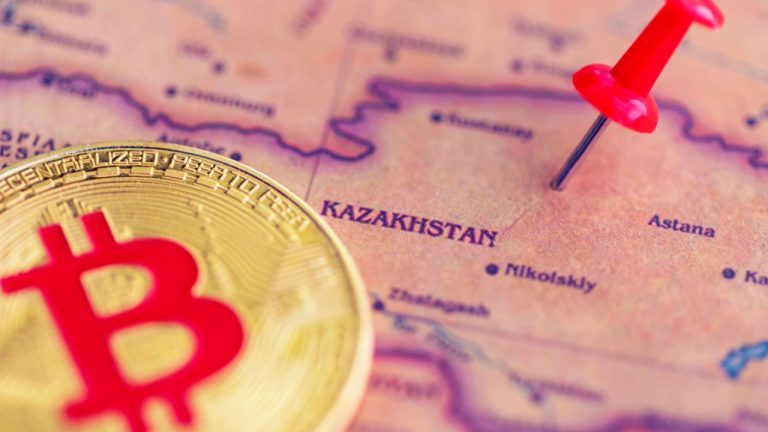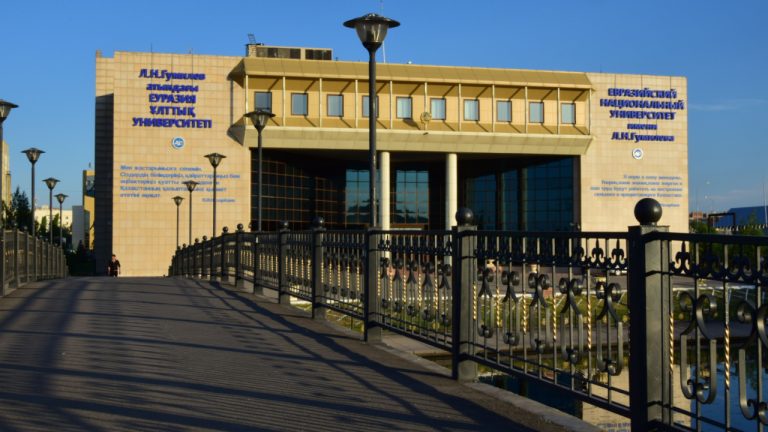 Central banks show continued demand for gold in 2023, as per a recent report from the World Gold Council (WGC), which noted that the world’s central banks accumulated 31 tons of the precious metal in January. Turkey was the largest gold buyer, adding 23 tons to its central bank’s stash, while the People’s Bank of […]
Central banks show continued demand for gold in 2023, as per a recent report from the World Gold Council (WGC), which noted that the world’s central banks accumulated 31 tons of the precious metal in January. Turkey was the largest gold buyer, adding 23 tons to its central bank’s stash, while the People’s Bank of […]
A new law signed by Kazakh President Kassym-Jomart Tokayev on Feb. 6 reinstated the nation’s stand against the unlawful mining operations and issuance of crypto assets.
Kazakhstan, one of the biggest Bitcoin (BTC) mining hubs in the world, announced plans to introduce new crypto regulations aimed at reducing tax fraud and unlawful business operations.
A new law signed by Kazakh President Kassym-Jomart Tokayev on Feb. 6 reinstated the nation’s stand against the unlawful mining operations and issuance of crypto assets. Out of the two distinct legislations, the first requires the secured digital assets issuers to have the government’s permission.
Moreover, such issuers will be subject to monitoring in accordance with the existing law of the land — “On Combating the Legalization (Laundering) of Proceeds from Crime and the Financing of Terrorism.” The law will enter into force from April 1, 2023.
The second legislation targets unsecured digital assets, typically earned through crypto mining operations. To reduce the possibility of tax evasion, crypto miners in Kazakhstan will require selling at least 75% of their revenue via registered crypto exchanges. This rule, which aims to collect “information on the income of digital miners and digital mining pools for tax purposes,” will be effective from January 1, 2024, to January 1, 2025.
All crypto mining licenses in Kazakhstan are issued for a limited period of three years — which differs based on whether or not the miner owns the mining facilities.
Related: Kazakhstan among top 3 Bitcoin mining destinations after US and China
Alongside introducing the above laws, Kazakhstan launched the pilot of its central bank digital currency (CBDC) project — the “digital tenge.”
Alongside the National Bank of Kazakhstan, #Binance presented a bilateral report on the “State of the Digital Assets Industry and DeFi in Central Asia”.
— Binance (@binance) February 3, 2023
The joint report provides an overview of crypto adoption, general trends of DeFi, and the local digital assets industry.
A report jointly published by the National Bank of Kazakhstan (NBK) and crypto exchange Binance NBK deputy governor Berik Sholpankupov wrote about the bank’s vision of a “collaboration between traditional finance and DeFi,” adding:
“In Kazakhstan, we also started a practical R&D project to explore how our CBDC – Digital Tenge, can bridge the world of crypto with traditional fiat payments infrastructure.”
Previously, in Oct. 2022, Kazakhstan’s Astana Financial Services Authority (ASFA) granted Binance a permanent license to manage a digital asset platform and provide custody services.
 A new law expanding the regulatory framework for cryptocurrency miners while restricting their access to low-cost electricity has entered into force in Kazakhstan. The legislation introduces a licensing regime for mining with two different categories of licenses that companies will have to renew periodically. President Tokayev Sings Law Regulating Crypto Assets Mining and Exchange in […]
A new law expanding the regulatory framework for cryptocurrency miners while restricting their access to low-cost electricity has entered into force in Kazakhstan. The legislation introduces a licensing regime for mining with two different categories of licenses that companies will have to renew periodically. President Tokayev Sings Law Regulating Crypto Assets Mining and Exchange in […] Financial authorities in Kazakhstan are starting a public consultation on draft changes to the country’s framework for digital-asset trading. The proposals include measures to reduce risks in the crypto market and improvements to the structure of exchange platforms. Kazakhstan’s Financial Hub Seeks to Amend Its Concept for Trading Digital Assets The Astana Financial Services Authority, […]
Financial authorities in Kazakhstan are starting a public consultation on draft changes to the country’s framework for digital-asset trading. The proposals include measures to reduce risks in the crypto market and improvements to the structure of exchange platforms. Kazakhstan’s Financial Hub Seeks to Amend Its Concept for Trading Digital Assets The Astana Financial Services Authority, […]
The Astana Financial Services Authority, a Kazakh regulator, pointed out that the existing framework dates back to 2018 while proposing certain enhancements.
Kazakhstan, one of the world’s biggest Bitcoin (BTC) mining destinations, issued a consultation paper to gauge public interest in proposed amendments to improve the cryptocurrency trading framework.
The policy paper, released on Jan. 27, was laid down by the Astana Financial Services Authority (AFSA), a Kazakh regulator. The AFSA pointed out that the Astana International Financial Centre’s Digital Asset Trading Facility (DATF) regulatory framework dates back to 2018 and that the amendments seek to introduce certain enhancements.
AFSA’s analysis highlighted problems related to the ongoing supervision of crypto exchanges, revealing “contradictions, inefficient provisions and uncertain definitions within the regime.” It recommended introducing risk mitigation measures around several fronts, including governance, illicit activity, safekeeping of clients’ funds and settlement.
Regarding DATF framework restructuring, the paper recommended three options — keeping the existing framework form, developing a standalone DATF framework and treating crypto exchanges as a multilateral trading facility.
The AFSA believes that the policy recommendations will bring about several improvements, including risk mitigation related to crypto operations and the industry in general. In addition, the enhancements will address contradictions and unclear provisions of the existing framework. The final outcome, expected by AFSA, is to create a favorable regime for crypto exchanges while encouraging innovation.
According to the policy paper, the proposed measures will have a positive impact on crypto trading industry:
“This will collectively help to create more a clear, convenient, efficient, detailed and balanced AIFC DATF framework with high standards for consumer protection, without hindering development of crypto exchanges.”
On an end note, the paper revealed that the review of the DATF framework aligns with the “AFSA’s Strategy for 2022” initiative, where the development of “Digital Assets framework: Crypto exchanges, STO and DASP” is one of three key regulations development objectives.
Related: Kazakhstan ready to legalize crypto as Russians flock to the country
On the other end of the spectrum, Kazakhstan’s central bank recommended launching an in-house central bank digital currency (CBDC) in 2023, with a phased expansion of functionality and introduction into commercial operation until the end of 2025.
In October 2022, Binance CEO Changpeng “CZ” Zhao revealed that Kazakhstan’s CBDC would be integrated with BNB Chain, a blockchain built by the crypto exchange.
 Lawmakers in Nur-Sultan have approved the final version of the law “On Digital Assets in the Republic of Kazakhstan.” The new legislation, including several other bills, regulates the circulation of cryptocurrencies in the country and introduces a licensing regime for crypto miners and exchanges. Senate Votes on Crypto Law, Sends It to President of Kazakhstan […]
Lawmakers in Nur-Sultan have approved the final version of the law “On Digital Assets in the Republic of Kazakhstan.” The new legislation, including several other bills, regulates the circulation of cryptocurrencies in the country and introduces a licensing regime for crypto miners and exchanges. Senate Votes on Crypto Law, Sends It to President of Kazakhstan […] Financial authorities in Kazakhstan have targeted at least five online platforms exchanging cryptocurrencies outside the law. Documents, computer equipment, and cryptocurrency wallets have been seized during searches in the northern part of the country. Kazakhstan’s Financial Watchdog Goes After Unlicensed Crypto Exchange Services The Financial Monitoring Agency (FMA) of the Republic of Kazakhstan has dismantled […]
Financial authorities in Kazakhstan have targeted at least five online platforms exchanging cryptocurrencies outside the law. Documents, computer equipment, and cryptocurrency wallets have been seized during searches in the northern part of the country. Kazakhstan’s Financial Watchdog Goes After Unlicensed Crypto Exchange Services The Financial Monitoring Agency (FMA) of the Republic of Kazakhstan has dismantled […] Since the beginning of 2023, cryptocurrency miners operating in Kazakhstan are obliged to pay new fees for the power they need to mint digital coins. A surcharge introduced in 2021 now depends on the price of electricity consumed by bitcoin farms and can be much higher than the original levy. New Year Brings Higher Costs […]
Since the beginning of 2023, cryptocurrency miners operating in Kazakhstan are obliged to pay new fees for the power they need to mint digital coins. A surcharge introduced in 2021 now depends on the price of electricity consumed by bitcoin farms and can be much higher than the original levy. New Year Brings Higher Costs […]
The FTX crash could trigger a bigger demand for crypto OTC services as investors are looking for alternative crypto exchange methods amid weak trust in CEXs.
Before the rise of centralized exchanges (CEXs), over-the-counter (OTC) trading was the go-to method to buy or sell cryptocurrency for many crypto investors. The FTX collapse could trigger a bigger demand for crypto OTC services as investors are looking for alternative methods to convert from and to fiat due to weaker trust in CEXs.
Cointelegraph spoke with BestChange, a Russian OTC crypto exchange aggregator, to learn more about the current state of OTC markets.
“The role of OTC is sometimes underestimated amid the all-encompassing marketing of centralized exchanges,” BestChange chief analyst Nikita Zuborev said. According to the exec, OTCs often act as an entry point to crypto for most users.
BestChange users often resort to the services of OTC exchangers — portals that act as fiat onramps to crypto — in order to replenish the balance on a crypto exchange or sell their crypto, Zuborev told Cointelegraph.
“If for the Central European countries and the countries of North America there are quite convenient ways of direct replenishment from a bank card, then for the countries of Eastern Europe and Central Asia there are no such options, and exchangers remain the only convenient way to work with cryptocurrency,” Zuborev stated.
The exec also pointed out that the latest industry events could have a positive effect on the crypto OTC segment, stating:
“Thanks to the fiasco of the FTX executives, our segment could see a significant influx of users even outside of our traditional market. We expect that 2023 could be the year of decentralization and accelerated development of decentralized apps.”
Founded in 2007, BestChange enables crypto-to-fiat transactions through Visa and Mastercard cards as well as services like PayPal, Payoneer, Skrill and others. Currently operating under the jurisdiction of the Russian Federation, BestChange plans to move its headquarters to Dubai gradually.
The executive stressed that the relocation has nothing to do with the ongoing geopolitical problems or other issues in Russia, as BestChange has been planning to expand beyond the country for a while.
Additionally, BestChange doesn’t expect any pressure from the global community in terms of sanctions, according to Zuborev. “The UAE continues to remain neutral in geopolitical matters, and secondly, the format of our business does not involve the handling of money,” he said. BestChange-listed OTC crypto exchangers are located in the Baltic countries or central Europe and should comply with local regulations, he noted.
Related: Russia intends to launch a ‘national crypto exchange’
BestChange serves several countries, including post-Soviet states like Ukraine, Kazakhstan, Georgia and Belarus. According to data from SimilarWeb, users from Russia and Ukraine make the biggest amount of visits on BestChange, with 48% and 15% of traffic coming from these countries, respectively.
“Most centralized exchanges are under pressure from European and North American regulators, and our segment is mostly represented by small local services that obey the laws of the country of location so they can serve Russians, Ukrainians, Europeans, Africans, residents of Asia, Oceania independently of each other,” he stated.
According to Zuborev, global sanctions against Russia have not had a negative impact on BestChange’s OTC market services but even have driven more adoption instead.
 Cryptocurrency exchange Binance is behind an initiative to qualify university students in Kazakhstan to work in the industry. Under an agreement with the government, the blockchain course will be added to the curricula of higher education institutions across the country. Binance Exchange to Help Teach Blockchain at Kazakhstan’s Universities The world’s largest crypto exchange, Binance, […]
Cryptocurrency exchange Binance is behind an initiative to qualify university students in Kazakhstan to work in the industry. Under an agreement with the government, the blockchain course will be added to the curricula of higher education institutions across the country. Binance Exchange to Help Teach Blockchain at Kazakhstan’s Universities The world’s largest crypto exchange, Binance, […]